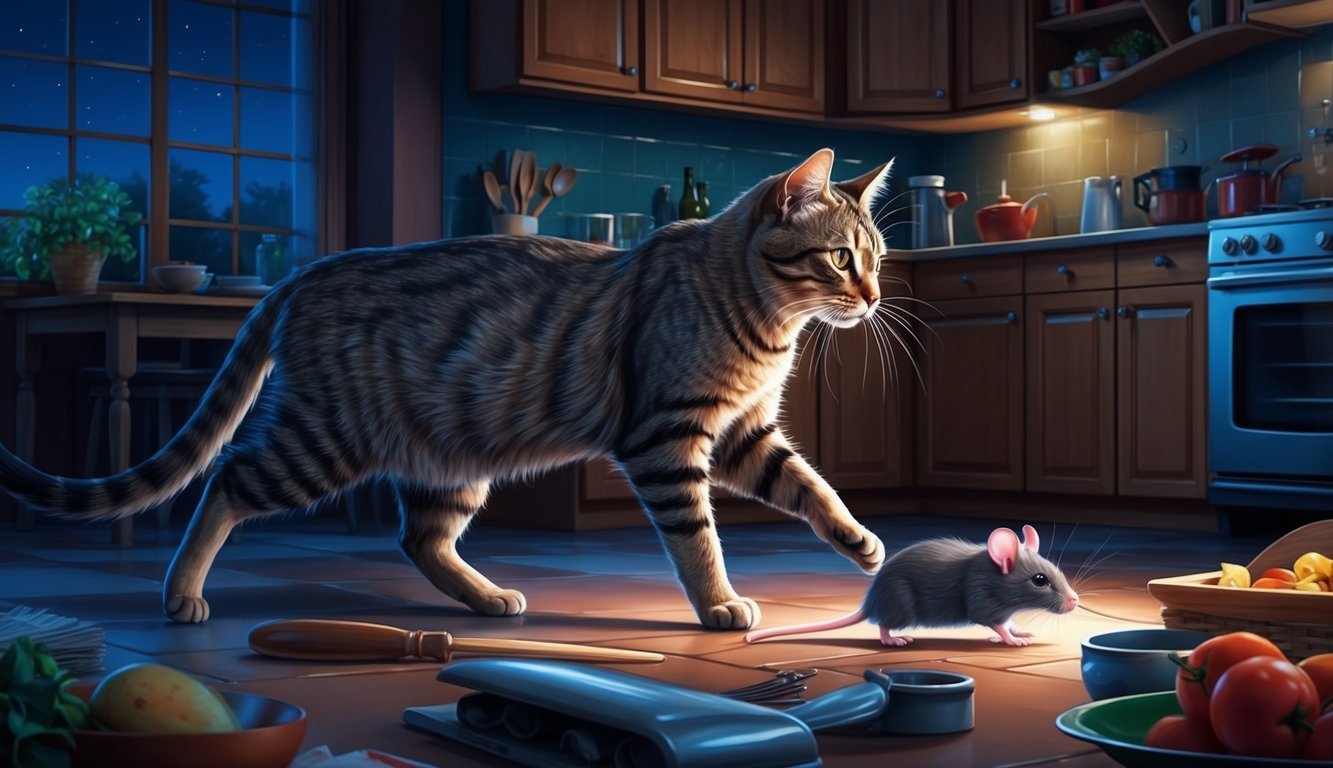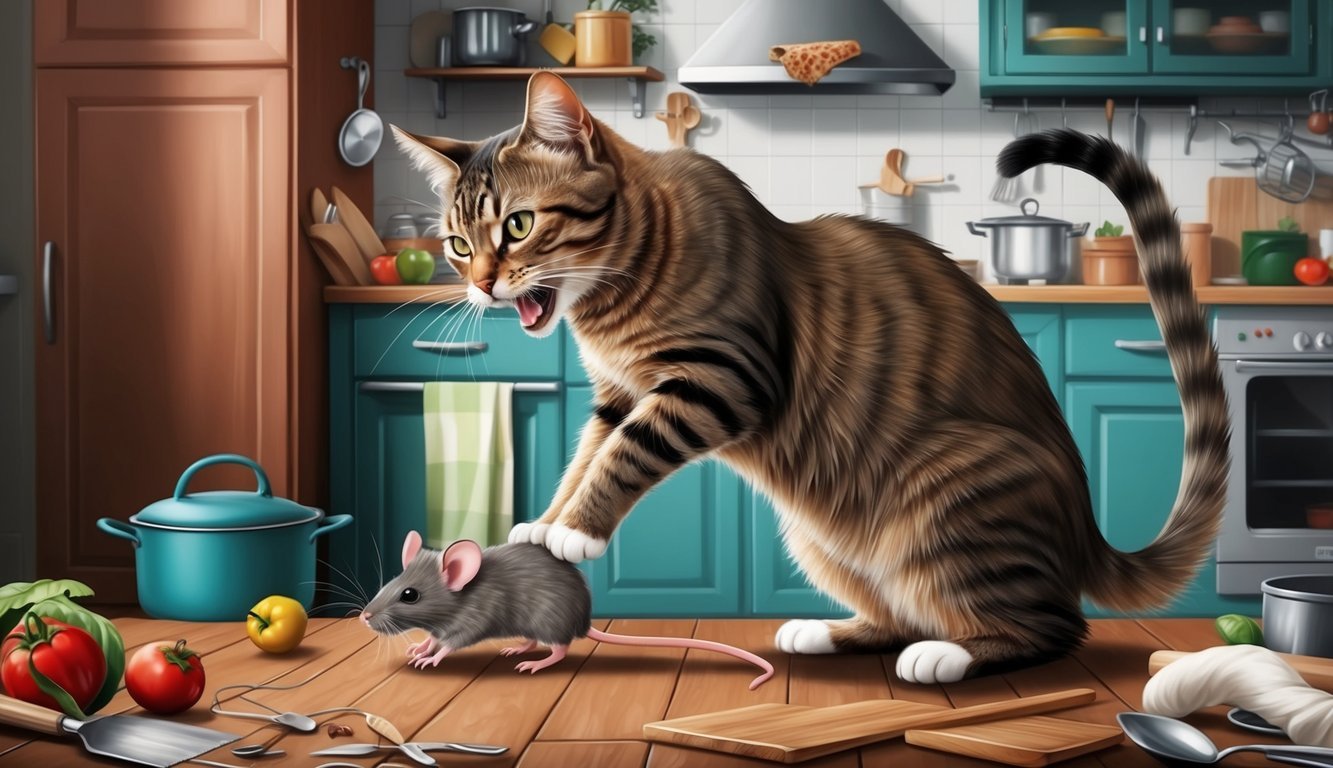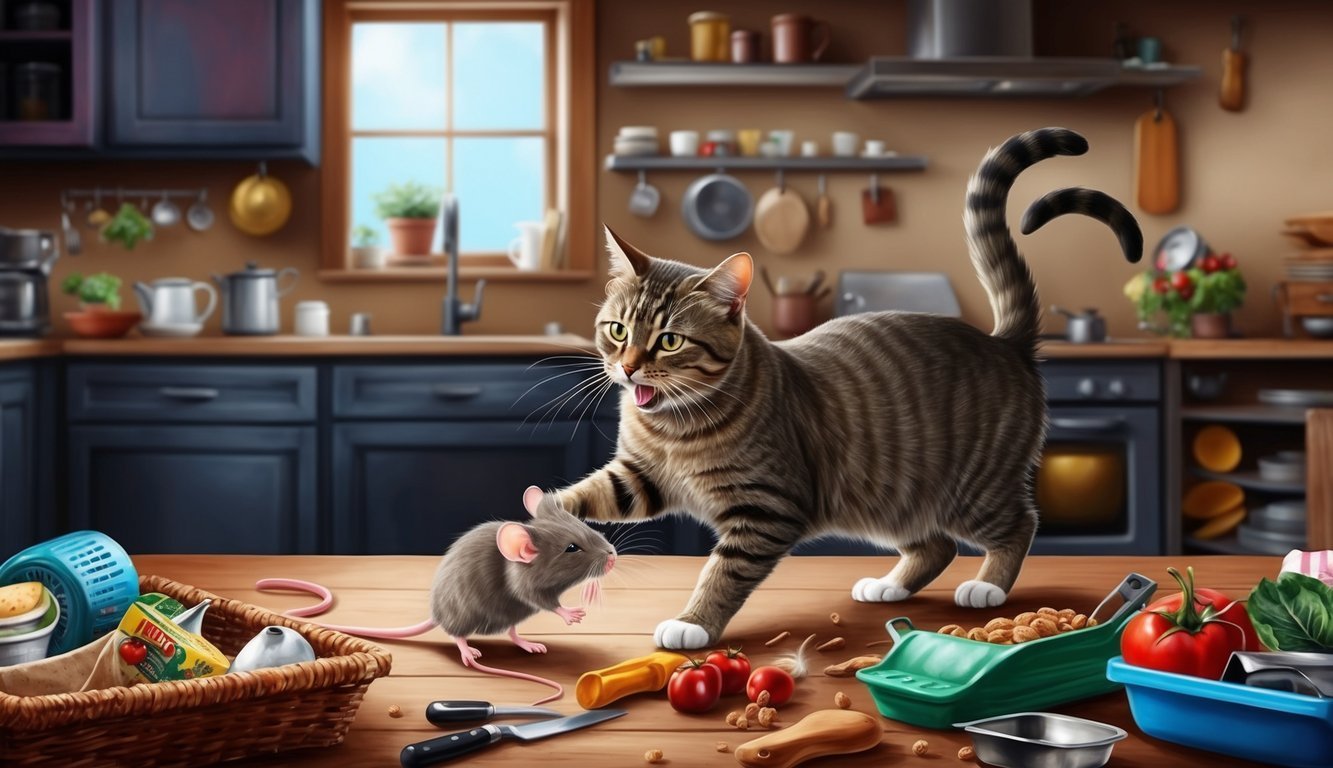Cats have long been celebrated for their hunting abilities, leading many to wonder if they can effectively keep mice away from their homes. While cats are natural predators, they may not be enough to eliminate a mouse problem. You might find that their instinct to chase and hunt for fun helps deter rodents, but it doesn’t guarantee a mouse-free environment.
Understanding your cat’s behavior can provide insight into how they interact with pests.
Cats hunt not just for food but also as a form of play, leveraging their natural instincts.
This can indeed make your home less appealing to mice, especially if you use their presence strategically by placing their belongings near potential entry points.
It’s essential to combine your feline friend’s natural tendencies with other pest control measures to ensure your home remains mouse-free.
By acknowledging both the capabilities and limitations of cats in pest management, you can take a more proactive approach in your efforts.
Key Takeaways
- Cats can deter mice due to their hunting instincts.
- A multi-faceted approach is best for pest control.
- Understanding cat behavior is key to leveraging their abilities.
Understanding the Feline Predator
Cats possess remarkable instincts as natural hunters.
Their skills and behaviors have evolved for effective predation, making them adept at catching small animals like mice.
Here’s a closer look at their hunting instincts and behaviors.
Natural Hunting Instincts of Cats
From a young age, kittens exhibit behaviors that mirror hunting.
These include stalking, pouncing, and batting at objects.
Playtime often involves chasing after toys, which simulates the movements of prey.
Your cat’s keen eyesight and a highly developed sense of hearing help it detect movements even in low-light conditions.
In addition, their whiskers are sensitive to vibrations, offering another layer of awareness.
These natural instincts are not only amusing to watch but also serve a vital role in their ability to hunt effectively.
Cats as Natural Predators
As carnivores, cats are equipped with the physical attributes needed for hunting.
Sharp claws allow them to grasp and hold onto prey, while their teeth are designed to tear flesh.
Cats are solitary hunters, relying on stealth rather than pack dynamics.
They tend to ambush their prey, utilizing their agility and speed to catch small animals quickly.
The combination of their sharp senses and physical attributes makes them effective predators both indoors and outdoors.
Hunting Behavior and Skills
Hunting is a complex behavior that involves various skills.
Your cat’s method often varies based on the environment and the type of prey.
Common techniques include stalking silently and waiting for the right moment to pounce.
Cats are also known to use their sense of smell to locate prey.
When hunting mice, the presence of cat scent alone can instill fear, prompting mice to avoid those areas.
Additionally, house cats may even engage in “playing” with their prey, which allows them to practice their skills while in a safe environment.
This natural behavior underscores their inherent predatory instincts.
The Impact of Domestication on Hunting
While domestication has altered some aspects of a cat’s behavior, their hunting instincts remain intact.
Even indoor cats exhibit hunting behaviors when they play with toys or chase after light spots.
Domesticated cats still retain strong predatory drives.
They instinctively respond to movement and sounds, landing their “kills” as if catching real prey.
However, the domestication process can sometimes reduce their need to hunt for food, leading to less active hunting behaviors.
Regardless, your cat’s natural instincts remain potent, contributing to their role as effective mouse deterrents.
The Reality About Cats and Mice
Cats are often viewed as natural predators of mice, and many people consider them a solution for rodent control.
Understanding the facts behind how cats interact with mice can help you decide whether adopting a cat will effectively manage a mouse problem.
Do Cats Actually Eat Mice?
Cats are obligate carnivores, which means they need meat to survive.
This drives their natural instinct to hunt, and mice are a common target.
While your cat may chase and kill mice, they don’t always eat them.
Often, the thrill of the hunt is more appealing than the meal itself.
It’s important to note that not every cat will have the same drive to hunt.
Some breeds are more motivated by instinct than others.
For example, breeds like the Siamese and Abyssinian are often more energetic and playful, leading them to hunt more actively.
How Effective Are Cats in Killing Mice?
Cats are skilled hunters, but their effectiveness can vary widely.
While they can kill mice, studies indicate that less than half of their hunting attempts are successful.
Factors such as a cat’s age, agility, and individual hunting experience play a significant role.
Mice breed quickly, so even if a cat catches a few, it’s possible for infestations to persist.
By the time a cat gets familiar with its hunting territory, the mouse population may have already increased again.
This rapid reproduction means relying solely on a cat for rodent control might not always suffice.
Mice Infestations and Cat Responses
If you have a mouse infestation, your cat may respond in different ways.
Some cats will actively hunt and display excitement, bringing you “gifts” in the form of caught mice.
In contrast, other cats may simply observe the mice from a distance without taking action.
Environmental factors also affect your cat’s response to mice.
If a home is too cluttered or noisy, a cat may feel less inclined to hunt, limiting their effectiveness in dealing with the issue.
Maintaining a clean, organized space can encourage your cat to display its natural hunting instincts.
Cat Breeds and Hunting Prowess
Certain cat breeds are known for their superior hunting abilities.
For example, the Maine Coon and the American Shorthair are recognized for their skills as mousers.
These breeds often exhibit higher levels of playfulness and hunting drive.
In contrast, breeds like the Persian or Ragdoll may not have the same level of interest in hunting.
When choosing a cat for rodent control, consider the breed and individual personality.
The right cat can make a significant difference in how effectively your home remains mouse-free.
Leveraging Cats for Pest Control
Using cats for pest control can be an effective way to manage mouse populations in and around your home.
Their natural instincts and behaviors can deter mice and help maintain a rodent-free environment.
Let’s explore how cats specifically contribute to keeping those pesky rodents at bay.
Cats as a Deterrent to Mice
Cats are natural predators of mice, and their presence alone can help keep these pests away.
Studies indicate that mice possess a heightened fear of cats.
Just the scent of a cat can make mice wary of entering certain spaces.
You might notice that your cat may not catch every mouse, but their hunting instincts drive them to patrol their territory regularly.
When a cat is around, mice are less likely to venture into your home, which is an essential aspect of pest control.
Understanding Cat Urine as a Repellent
Cat urine contains specific compounds that can repel mice.
The strong scent acts as a warning signal for rodents, indicating the presence of a predator.
If you place a cat’s litter box or bed near entry points, it can create an environment where mice are less likely to enter.
Mice have specialized organs that help them detect even minute traces of cat urine.
This can lead them to avoid areas where they’ve sensed a feline presence, effectively creating a natural barrier against infestations.
Outdoor Cats and Rodent Populations
Outdoor cats can play a significant role in controlling rodent populations.
They actively hunt and reduce the number of mice in your yard or garden, contributing to a more balanced ecosystem.
This can be particularly beneficial if you have a larger property where mice might thrive.
Keep in mind that while outdoor cats can lower mouse numbers, they also require careful management.
You’ll want to ensure their safety from potential hazards.
Also, encouraging a stable outdoor cat population can help maintain lower rodent levels over time.
Professional Exterminator vs. Cat Assistance
When facing a significant rodent problem, it’s essential to weigh your options between professional extermination services and hiring a cat.
Cats may serve as a long-term solution, offering continual pest control through their natural behaviors.
They reduce mice numbers while also providing companionship.
On the other hand, if your mouse problem is severe, professional exterminators can act quickly to address the issue.
They have specialized tools and techniques to eliminate established infestations.
In many cases, combining both methods can create an effective approach to keeping mice away.
Health Risks and Considerations

While having a cat can help deter mice, there are important health risks linked to both mice and the environment cats create.
Understanding these risks can help you safeguard your feline friend.
Parasites Transmitted by Mice
Mice are known carriers of various parasites.
When your cat catches or consumes a mouse, they can be exposed to fleas, ticks, and mites.
These parasites can lead to skin irritations and flea infestations in your home.
It’s also essential to consider that fleas can transmit tapeworms.
If your cat ingests infected fleas while grooming, they may develop a tapeworm infection.
Signs of this can include weight loss, increased appetite, or visible segments of the worm in your cat’s feces or around their rear.
Toxoplasmosis and Cats
Toxoplasmosis is caused by the parasite Toxoplasma gondii, which can be present in mice.
When a cat hunts and eats an infected mouse, they may contract this parasite.
Most cats remain asymptomatic, but the infection can pose risks.
If you’re pregnant, it’s particularly important to take precautions, as Toxoplasma gondii can be harmful to fetal development.
Symptoms in humans include flu-like signs, which makes it crucial for everyone in your household to be aware of the risks associated with mice and cat behavior.
The Threat of Roundworms
Roundworms pose another potential risk when cats hunt mice.
These parasites can be ingested through the consumption of infected rodents.
Roundworm infections can lead to various health issues, including diarrhea, vomiting, and nutritional deficiencies.
You can recognize a roundworm problem in your cat by the presence of worms in their stool or a bloated abdomen.
Regular vet check-ups and deworming treatments help manage these risks effectively and keep your cathealthy.
Preventative Measures for Rodent Control
To effectively manage mice in your home, it’s essential to combine several strategies.
By sealing entry points, properly storing food, leveraging cat litter, and considering alternative mouse traps, you can significantly reduce the likelihood of an infestation.
Sealing Entry Points
One of the most effective ways to keep mice out is by sealing possible entry points.
Mice can squeeze through gaps as small as 1/4 inch, so inspect your home thoroughly.
- Check windows and doors: Ensure they close tightly and are free from gaps.
- Seal holes in walls: Use caulk or steel wool for holes around pipes and cables.
- Examine the foundation: Small cracks should be filled to prevent access.
Making your home less accessible will assist greatly in deterrence.
Proper Food Storage Techniques
Mice are driven by food, so proper food storage is crucial in preventing infestations.
Store food in airtight containers to make it less appealing.
- Choose hard containers: Glass or heavy plastic works well.
- Keep pet food sealed: Store it in airtight bins when not in use.
- Clean up spills: Promptly clean any crumbs or spills to cut off food sources.
By limiting accessible food, you can significantly reduce mouse attraction to your home.
The Role of Cat Litter in Deterrence
Using cat litter can serve as a deterrent by exploiting mice’s instinctual fears.
The scent of a cat can make rodents think twice about entering your space.
- Place cat litter near entry points: This can help create a barrier that mice may avoid.
- Change litter regularly: Fresh litter maintains the scent and effectiveness.
This method might not guarantee a mouse-free environment, but it can help reduce their presence when used alongside other methods.
Alternative Mouse Traps
In case of a mouse sighting, having alternative mouse traps can be beneficial.
These can provide a humane approach to rodent control or help quickly eliminate any threats.
- Snap traps: Quick and effective for immediate action.
- Live traps: Humanely capture mice for relocation.
- Electric traps: Offer a clean solution by delivering a quick kill.
Selecting the right traps provides you with options that align with your preferences and values while ensuring your space remains rodent-free.
Final Considerations

When considering the use of cats for mouse control, it’s essential to weigh both their advantages and limitations.
Understanding how cats interact with mice can help you make informed decisions about your pest control approach.
Advantages and Limitations of Using Cats
Cats are natural hunters, equipped with excellent mice hunting skills.
Their instinct to chase and capture small prey can be effective in reducing mouse populations in your home.
By simply having a cat around, you can create an environment that mice might avoid.
Advantages include:
- Natural deterrent: The mere presence of a cat can discourage mice from entering your space.
- Reduced chemical use: Employing a cat diminishes the need for pesticides, which can be harmful to other wildlife and pets.
Limitations are:
- Not all cats have the same hunting drive; some might be more interested in play than in actual hunting.
- Cats may kill mice for sport rather than for food, which might not significantly impact numbers.
Attracting Mice: Potential Downside
While you might think having a cat will solve your mouse problem, there can be unexpected downsides.
Mice can sometimes be attracted to food or unfamiliar smells, including those associated with cats.
Factors to consider:
- If a cat is fed indoors, mice may be attracted to the food source.
- Cat litter boxes can also become an attraction point if not kept clean and well-maintained.
It’s crucial to monitor these factors to ensure that your efforts are not inadvertently drawing more mice into your living space.
Creating a Balanced Ecosystem
The presence of cats can contribute to a balanced ecosystem in your home, but this balance requires careful management.
Understanding the relationship between your pets and pest populations is vital.
Essentials for balance:
- Scent marking: Cats naturally mark territory, and their scent can deter mice. You might consider placing cat beds or litter boxes near entry points.
- Hunting opportunities: Allowing your cat outdoor access can enable them to utilize their natural hunting instincts, effectively reducing nearby mouse populations.
Maintaining this balance is key.
While cats can help control mice, be mindful of their needs and the environment to achieve effective mouse management.
Frequently Asked Questions

If you’re considering getting a cat to manage a mouse issue, you likely have some common questions.
Here, we’ll address specific concerns and clarify how effective cats can be in dealing with mice.
Can owning a cat help control a mouse problem in the home?
Yes, owning a cat can help control a mouse problem.
Cats are natural hunters, and their presence can deter mice from invading your space.
Their instinct to chase and hunt can reduce the number of mice over time.
Is borrowing someone else’s cat an effective way to deal with mice?
While borrowing a cat might seem like a quick fix, it’s not guaranteed to be effective.
Cats have different personalities; some may show interest in hunting, while others may not.
The borrowed cat might also be unfamiliar with your home environment.
How quickly can a cat eliminate a mouse infestation?
The speed at which a cat addresses a mouse infestation varies.
Some cats might catch mice almost immediately, while others may take longer.
Factors like the cat’s hunting skills and the size of the infestation play significant roles.
Will the presence of cats deter mice from entering an area?
Yes, the presence of cats often deters mice.
Mice can sense predators nearby, making them less likely to enter spaces occupied by cats.
This deterrent effect can help prevent future infestations.
Why do I still see mice around even though I have a cat?
Seeing mice around while having a cat can occur for several reasons.
Not all cats have strong hunting instincts, and some may not be interested in chasing mice.
Additionally, if the mouse population is large, the cat may not be able to keep up.
What other animals are known to help keep mouse populations down?
Dogs, ferrets, and certain birds of prey are also known to help with mouse control.
Each of these animals has its own hunting skills and can contribute to managing mouse populations when introduced into the environment.


